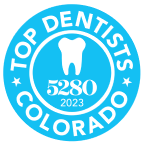The dentists at Metro Dental Care of Denver are fully committed to helping our patients retain their natural, healthy teeth throughout life. Sometimes, however, a tooth extraction is the best, or only, procedure that can restore optimal oral health. We only recommend tooth extraction as a last resort.
The most common reasons for removing a tooth is that it’s unhealthy and irreparable or the patient needs to make room for a prosthetic, like a bridge or denture. Extraction is also indicated in some orthodontic cases and for impacted or painful wisdom teeth.
If you’ve been told you need an extraction and you want a second opinion, or you would like to learn about dental implants after extraction, call Metro Dental Care today at 303-534-2626.
Preparing for Your Tooth Extraction Procedure
If your trusted dentist has prescribed tooth removal, it’s okay. With modern tools and medications, extraction is a common procedure. There are some things you need to tell your dentist prior to the procedure.
Medications – Let your dentist know about all medications, vitamins, supplements, and over-the-counter drugs that you take. This includes NSAIDs like aspirin, ibuprofen (Advil, Motrin), naproxen (Aleve), and acetaminophen (Tylenol).
Bisphosphonate – If you will soon be treated for a medical condition (like osteoporosis) by receiving bisphosphate intravenously, your tooth extraction should be performed beforehand.
11 Conditions – If you suffer from any of these conditions, please let your dentist know before you undergo tooth extraction.
- Adrenal Disease
- Artificial joint(s)
- Congenital heart defect
- Damaged heart valves
- Diabetes
- Hypertension
- History of bacterial endocarditis
- Impaired immune system
- Liver disease
- Renal disease
- Thyroid disease
Plan to wear loose, comfortable clothing for your tooth extraction appointment. We want you to be as comfortable as possible.
During the Procedure
The length of your tooth extraction procedure will depend upon whether it is a routine or surgical extraction. Teeth with more complex roots or damage may require surgical extraction, which is a bit longer and may be performed with the patient under sedation for optimal comfort.
After administering medication to make you comfortable during throughout procedure, the doctor will begin. To remove your tooth, the dentist will incise the gum tissue and to access the tooth’s root. Molars may be cut into sections prior to removal. In some cases, a small section of bone may need to be removed as well.
If the dentist gives you a sedative, plan to have a driver take you home. Then, you will need to rest the remainder of the day, and possibly the following day, as your tooth socket forms a clot.
Post-Extraction Home Care Instructions
At home, you can wrap ice or an ice pack in a soft towel and place it on the exterior cheek, over the extraction site. Ice your mouth for ten minutes, then wait another ten minutes before reapplying.
Leave your gauze in place for four hours following the procedure. If it becomes blood-soaked, you may remove and replace it.
DO NOT:
- Use a straw for 24 hours
- Smoke
- Rinse your mouth for 24 hours
- Spit
- Drink alcohol
DO:
- Take recommended pain medication as instructed
- Relax – no lifting or straining
- Eat soft foods only for a few days
- Keep your head elevated on a pillow when lying down
- Brush and floss your teeth the next day, avoiding the extraction site
- Rinse your mouth with salt water after 24 hours
More Information About Tooth Extraction
If you experience bleeding for over 12 hours, nausea with vomiting, severe fever, chills, chest pain, shortness of breath, cough, or swelling that does not subside over 24 hours, call your dentist for advice. He may want to see you to determine if you’ve developed an infection.
Have you been told that you need a tooth extraction? Call Metro Dental Care of Denver today at 303-534-2626 or email us from our website. We’ll be happy to provide a second opinion and answer all of your questions about what to do before, during, and after your tooth extraction, should it be the healthiest option. We offer dental implants, as well as implant-retained dentures, bridges, and crowns to replace lost or extracted teeth.

